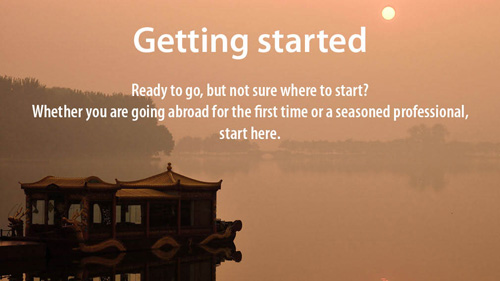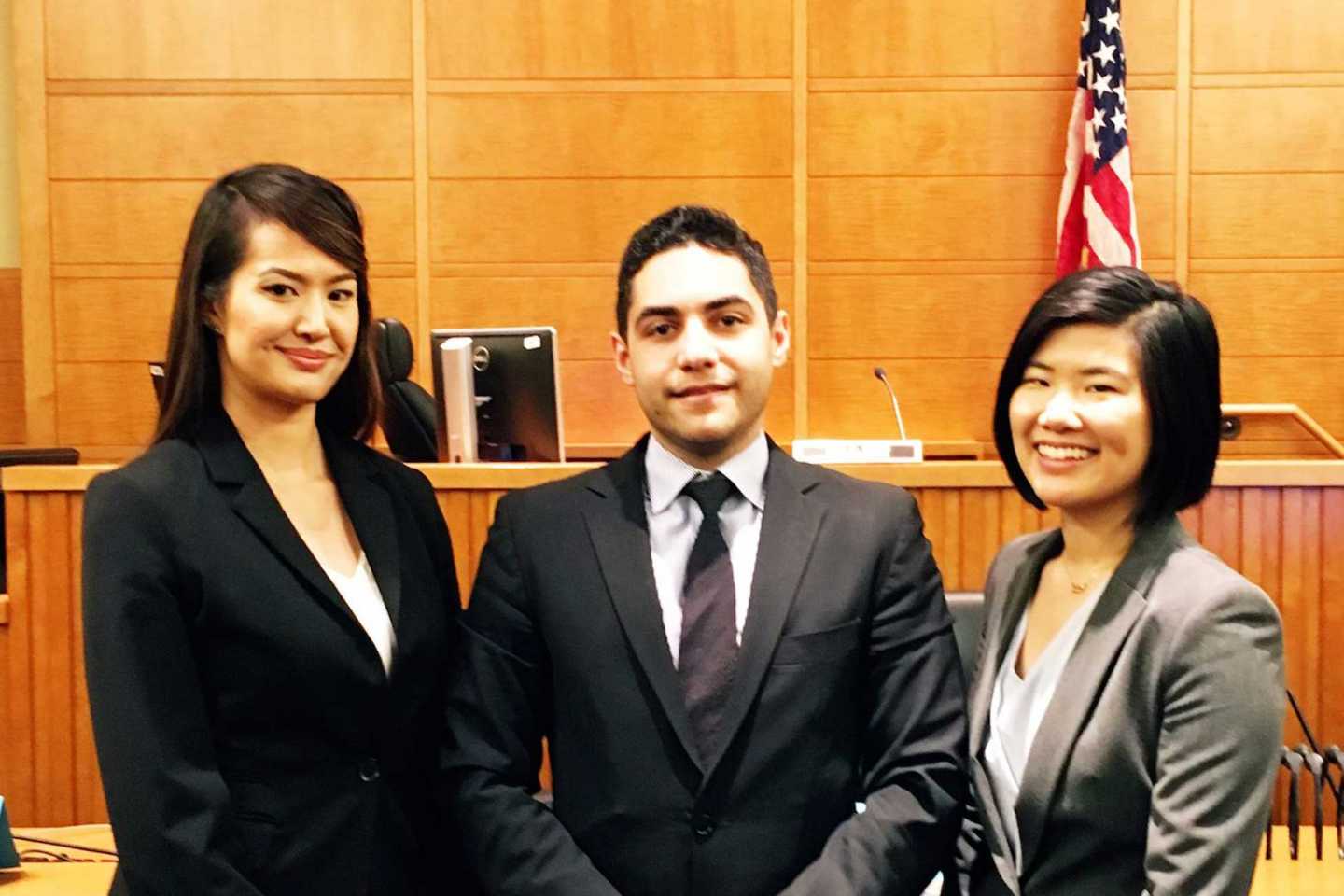Who is working in international law?
The job titles and portfolios in international law are diverse, but professionals typically have, at minimum, a law degree (Juris Doctor, J.D.), or a Masters of Law (LL.M).
Many continue their education and specialize in a particular area of the law: intellectual property rights, public health, international relations, etc. Essentially, the more you know about a specific area, or issue, the more desirable you’ll become to a non-governmental organization, the United Nations, or a private law firm.
Depending on the kind of law you want to work in, or practice, the international opportunities are wildly varied. You might be working for the United Nations in Greece, living in a refugee settlement, and accepting the bare minimum living conditions that come with such a position. On the other end of the spectrum, you might be living in Paris, working with a larger private law firm, and living quite comfortably.
Professionals working in international law also share a few traits in common: they’re excellent communicators – skilled listeners, public speakers, and mediators – and capable of working in multi-ethnic environments. Many speak several languages, including the official UN languages – English, French, Arabic, Chinese, Russian and Spanish.
“It can be very challenging dealing with foreign laws, which are usually written in a different language,” says Dule Vicovac, a Senior Legal Advisor who works with a European Union legal aid project assisting refugees from Bosnia and Croatia.
Working in international law isn’t for everyone. On average, international lawyers will change careers every 2.5 years. Those who are successful in the field get used to being on the move, accepting short-term contracts (often only six months to a year) and building up to longer-term, more stable work.
“You have to be light on your feet, and fast to rise to the challenges that come to you when working internationally,” says Daphne Dumont, an experienced lawyer and board member with the Canadian Bar Association.
The first years are often the most turbulent for international lawyers. If you can manage the constant travel and stepping into new jobs, workplaces, and cultural contexts, then this is the field for you.
What does it take to work as an international lawyer?
There isn’t a set path to success; however, it’s critical to gradually build up a solid CV that will impress employers. Education, work and volunteer experience, specialization, cultural competencies, and the right mindset will set you apart from the rest.
Most positions abroad require, at a minimum, that you graduate with a law degree (Juris Doctor, J.D.), or a Masters of Law (LLM) degree. Others require that you go a step further and become a ‘called lawyer’, which involves articling, or completing an apprenticeship with an employer for a full year, followed by writing and passing the bar exam.
Some law graduates do their articling internationally, while others stay in their home country to article, and later apply for international positions. There’s no formula for success. However, some organizations and companies prefer to hire an attorney with at least three to five years of experience, which may mean you need to start your legal career at home before pursuing international work. Alternatively, you may jump straight into international work by doing an unpaid, or paid internship with an intergovernmental body, such as the United Nations, and slowly complete your articling over time.
Choose the right law school – It’s critical to apply to law schools that offer courses that focus specifically on international law, along with activities – internships, clinics, workshops, and lectures – that will help you gain experience working in international law.
Consider studying abroad – Acceptance into Canadian law institutions can be an arduous, competitive process, and as a result, you may look to apply to law schools in the U.S., or U.K, or elsewhere. Nadine Kheshen, a recent law graduate, looked beyond Canada’s borders and chose to study at Loyola School of Law in Los Angeles, U.S. “I chose the school based on the fact they had a human rights clinic and a genocide centre, and that they offered a number of international classes,” said Kheshen.
Specialize – Those who choose to specialize their practice and knowledge of law can also have a leg up in the hiring process. Areas of specialization can include: going on to obtain a Masters of International Relations, or studying in the areas of international business, conflict and migration, gender studies, or public health. Employers are likely to look for candidates with expertise in areas of interest to them.
Develop skills through volunteer work – Seek out opportunities to cultivate your communication and leadership skills. International lawyers work in multi-ethnic, culturally diverse settings. It’s important to be able to listen, facilitate meetings, practice diplomacy, and communicate effectively in the field of international law. Cultivate your public speaking skills. Take risks and get used to putting yourself in new situations. During law school, apply for local and international summer internships. Paid, or unpaid, these internships will offer you enormous learning opportunities about the practice of law in different countries
Build your local and international connections – Who you know does matter. Throughout your undergraduate degree, and while in law school, it’s important to get involved with student associations and community organizations, for example, the local United Nations chapter, or the International Business Student Association. Keep your eyes open for opportunities: attend relevant lectures and speakers’ series, go to conferences, and get to know your professors. Consider participating in Moot Court Competitions (mock court cases). Share your career goals with other students and colleagues, and your mentors – build a network of people who are willing to support your goals.
What do I need to know before working internationally?
Even before applying for international positions, it’s critical to do your research and show your commitment – and capacity – for working in a particular geographical, or cultural region. As most positions tend to be shorter-term contracts (six to eight months, for example), you need to prepare before arriving so you can hit the ground running.
Employers will look for people with language skills, knowledge of the basic differences between different legal systems around the world, and, as well as their political and cultural contexts in different countries.
It’s also important to check any unrealistic, or ‘noble’ intentions at the door before traveling to another country. “We typically avoid hiring people who have unrealistic expectations of saving the world,” says Daphne Dumont, board member with the Canadian Bar Association, which offers the Young Lawyers International Program to emerging professionals.
“Instead, we look for candidates with a basis of self-confidence because they’re going to encounter difficult situations, personally and professionally, as they’re working inter-culturally and in new legal frameworks,” says Dumont.
“If they travel with a large degree of humility – the sense that they’re going abroad to learn – then they will be successful.”
Checklist for aspiring international lawyers
Ask yourself the important questions – What kind of lawyer do you want to be? What kind of career do you want? What kind of lifestyle do you want to live? Reflect on who you are and how you will fit into a career in international law. Take Harvard Law School’s Personal Assessment to better articulate your goals.
Develop your skills locally and internationally – Find ways to volunteer, or work locally to build self-confidence, and the hard skills that will be important to your future career. For example, volunteering at a Canadian legal aid clinic, which provides support to immigrants and refugees, is hugely transferrable to working with vulnerable populations in other countries. Key career skills to have in your toolkit, include:
→ Cross-cultural communication and dialogue;
→ Public speaking;
→ Writing, research, and organization;
→ Leadership and facilitation experience;
Learn an official United Nations’ language – Focus on a region in the world where you’d love to work and learn the language before you travel. The official United Nations’ languages include, English, French, Arabic, Chinese, Russian and Spanish.
Write, research, and publish articles on international law issues – Refine your expertise on a particular international issue, or region of the world without even leaving home. During law school, seek opportunities to conduct research on the legal issues you’re passionate about. Submit your articles to various law journals for publication – a published article is certain to impress future employers.
Join national and international law associations – Membership with national and international law associations, and following their social media sites, will keep you up-to-date on international law opportunities, including workshops, conferences, jobs, and internships. Check out:
→ International Law Student Association (ILSA)
→ Canadian Lawyers for International Human Rights (CLAIHR)
→ Canadian Bar Association (CBA)
→ American Bar Association (ABA)
→ International Law Association (ILA)
Apply for global internships – Internships are critical to building experience as an international lawyer. Seek out opportunities – paid, or unpaid – at your university, or through a government, or intergovernmental organization. Check out the Canadian Bar Association’s Young Lawyers International Program, or internship opportunities with Lawyers Without Borders. Also visit the International Law Student Association’s compiled list of jobs and internships at public and private institutions.
Cultivate professional connections – On the slow road to success in international law, make friends with your peers and strive to impress your superiors. Every interaction matters. Broaden your network by attending law conferences, reaching out to local lawyers, seeking the support of your law professors, and joining law student associations. The more genuine relationships you’re able to cultivate helps you identify opportunities, vouch for your talent and past experiences, and increase your odds of breaking into the field.
Add to Favorites


